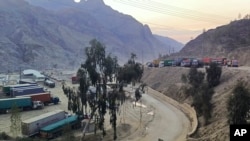Pakistan and Afghanistan's Taliban authorities have met multiple times in the last week to negotiate the reopening of their main border crossing but could not make headway, stranding many trade convoys and travelers on both sides for the fourth consecutive day Saturday.
Pakistani officials said the standoff erupted Wednesday after Taliban guards began constructing a new outpost near the historic Torkham border crossing, violating mutual agreements and ignoring warnings to stop the work.
The tensions eventually led to brief skirmishes between border security forces from the two countries, killing a Taliban guard and a civilian, according to the Afghan side.
The Taliban rejected the allegations, saying the outpost was being built on the Afghan side of the nearly 2,600-kilometer (1,616 miles) British colonial-era boundary separating the two countries.
On Saturday, officials in both countries said the situation remains fluid and it is unclear when or if a resolution will be reached soon for all stranded travelers and truck convoys to resume their journey through the Torkham point of transit for trade and travelers.
Mufti Asmatullah Yaqoob, a senior Taliban official at Torkham, alleged while speaking to the BBC Afghan radio service that the Pakistani forces had started the armed clashes and closed the border gate. He rejected claims that Taliban guards were building the post on the zero point or the border conjunction.
"A zero point exists where there is a formal border, but this is just an imaginary line," Yaqoob said, referring to the border with Pakistan, which Afghanistan historically disputes and rejects as an international boundary.
Islamabad rejects Afghan objections, saying it inherited the international border after gaining independence from Britain in 1947.
Wednesday's conflict over the controversial outpost occurred just hours after hundreds of heavily-armed Afghan-based militants stormed two Pakistani security outposts in the remote northern Chitral district close to the border at an elevation of 1,670 meters (5,479 feet).
Pakistan's military said the ensuing clashes killed four soldiers and 12 "terrorists" before the assailants retreated to Afghanistan.
The outlawed Tehrik-e-Taliban Pakistan (TTP), also known as the Pakistani Taliban, claimed responsibility for the attack. TTP leaders and fighters mostly reside across the border in Afghanistan and orchestrate cross-border terrorism from there, according to Pakistani officials and recent United Nations assessments.
Pakistani Foreign Ministry spokesperson Mumtaz Zahra Baloch said Friday that her government was in close contact with Afghan authorities.
"We have shared our concerns with regards to the terrorist threat against Pakistan that emanates from the Afghan soil... All these concerns and developments are relevant to the opening or closure of the border as well," Baloch stressed.
The Pakistani ministry also summoned the head of the Taliban-run Afghan Embassy in Islamabad and formally protested the Chitral cross-border terrorist raid and the Torkham incident, official sources said.
The Taliban envoy was told to convey to Kabul "our serious concern over TTP's use of Afghan territory to enter into Chitral" and attempts by the Taliban "to encroach upon Pakistani territory at Torkham," a senior Pakistani diplomat privy to the meeting told VOA Saturday. He spoke anonymously because he was not authorized to interact with journalists on the subject publicly.
In a media interview Friday, Taliban chief spokesperson Zabihullah Mujahid rejected allegations that the TTP attack in Chitral had originated in his country. He reiterated that his government is not allowing anyone to use Afghan soil to threaten other nations and advised Islamabad to stop blaming Kabul for its internal conflicts.
However, Pakistani officials and independent critics questioned Mujahid's claims that TTP does not exist in Afghanistan. A recent U.N. assessment estimated that more than 4,000 TTP militants are active on Afghan soil.
Islamabad maintains that the Taliban's return to power in Kabul in August 2021 has emboldened the TTP, and it increasingly uses Afghanistan as an operation base for orchestrating attacks in Pakistan.
The TTP's fugitive chief, Noor Wali Mehsud, has publicly pledged allegiance to Hibatullah Akhundzada, the supreme leader of the Taliban government, and has stated the Pakistani Taliban "is a branch" of the Afghan Taliban. Mehsud has been frequently spotted and spoken to journalists in Afghanistan after the Taliban takeover.
The Taliban hosted Pakistan's talks with the TTP leadership in Kabul last year but refused to evict the militants from the country. The dialogue process collapsed late last year, leading to a dramatic surge in deadly TTP attacks against Pakistani security forces.
Pakistan says that some militants killed during recent counterterrorism operations against the TTP were members of the Afghan Taliban and their bodies and other personal details were shared directly with Kabul authorities.
A foreign ministry official in Islamabad told VOA that in recent meetings with Kabul representatives, his government has unsuccessfully sought an explanation that "while the Taliban condemn Islamic state terrorist attacks in Pakistan, they maintain a stoic silence when the TTP conducts its attacks in Pakistan."
The official requested anonymity for not being authorized to speak to the media publicly.
He also questioned the effectiveness of a recent "diktat" or decree issued by Hibatullah declaring cross-border attacks by Afghan Taliban fighters as "haram" or forbidden.
"Either the Amir ul-Momineen (leader of the faithful) has no authority to implement his orders, or the (Afghan) Taliban are hand in glove with the TTP," the Pakistani official said, using the title the Taliban use for Hibatullah.







